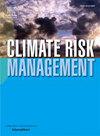Stakeholder engagement strategies to build resilience to compound hazards: Engaging community-based organizations in research
IF 5
2区 环境科学与生态学
Q1 ENVIRONMENTAL SCIENCES
引用次数: 0
Abstract
Climate extremes can generate impacts in one sector that cascade or amplify the impacts in others. Developing strategies that build resilience to these compound hazards requires collaboration among diverse stakeholders to understand hazard dynamics and the synergies and tradeoffs in adaptation activities. In many regions, community-based organizations (CBOs) lead in local climate adaptation, and their engagement in research can help inform research agendas and capacity-strengthening activities that support locally led adaptation. In this paper, we describe a co-produced, collaborative research project that convened CBOs working in climate adaptation, public health, and energy resilience in Puerto Rico. The goals were to identify knowledge gaps and opportunities for immediate action. Based on interviews, a participatory workshop, and a survey, we report on the CBO activities, their networks and their views on the relationships between climate, public health, and energy. We also describe their perspectives on priorities to address compound hazards. Drawing on these results, we discuss five strategies that can help research projects collaborate, co-produce, and engage with CBOs. They include understanding the network to inform engagement, paying attention to differential impacts and justice, employing flexible planning to accommodate multiple goals and perspectives, focusing on information sharing to advance collaboration, exploring narratives of change to understand adaptation and maladaptation, and confronting the question of “what next.” This study informs how research can more effectively engage CBOs in climate adaptation studies, which, in turn, can contribute to building plans and systems that are better equipped to build resilience to compound extreme events.
利益相关者参与战略以建立对复合危害的恢复力:让社区组织参与研究
极端气候可能对一个部门产生影响,进而对其他部门产生连锁或放大影响。制定针对这些复合灾害建立复原力的战略需要不同利益攸关方之间的合作,以了解灾害动态以及适应活动中的协同作用和权衡。在许多地区,社区组织(cbo)在当地气候适应方面发挥领导作用,它们参与研究有助于为研究议程和能力增强活动提供信息,从而支持地方主导的适应。在本文中,我们描述了一个共同制作的合作研究项目,该项目召集了波多黎各从事气候适应、公共卫生和能源恢复能力工作的cbo。目标是确定知识差距和立即采取行动的机会。根据访谈、参与性研讨会和调查,我们报告了CBO的活动、他们的网络以及他们对气候、公共卫生和能源之间关系的看法。我们还描述了他们对解决复合危害的优先事项的看法。根据这些结果,我们讨论了五种策略,可以帮助研究项目合作,共同生产,并与cbo接触。它们包括理解网络,为参与提供信息;关注不同的影响和公正;采用灵活的规划来适应多种目标和观点;注重信息共享以促进合作;探索变化的叙事,以理解适应和不适应;以及面对“下一步是什么”的问题。这项研究为研究如何更有效地让cbo参与气候适应研究提供了信息,而气候适应研究反过来又有助于制定更好的计划和系统,以建立对复合极端事件的抵御能力。
本文章由计算机程序翻译,如有差异,请以英文原文为准。
求助全文
约1分钟内获得全文
求助全文
来源期刊

Climate Risk Management
Earth and Planetary Sciences-Atmospheric Science
CiteScore
8.20
自引率
4.50%
发文量
76
审稿时长
30 weeks
期刊介绍:
Climate Risk Management publishes original scientific contributions, state-of-the-art reviews and reports of practical experience on the use of knowledge and information regarding the consequences of climate variability and climate change in decision and policy making on climate change responses from the near- to long-term.
The concept of climate risk management refers to activities and methods that are used by individuals, organizations, and institutions to facilitate climate-resilient decision-making. Its objective is to promote sustainable development by maximizing the beneficial impacts of climate change responses and minimizing negative impacts across the full spectrum of geographies and sectors that are potentially affected by the changing climate.
 求助内容:
求助内容: 应助结果提醒方式:
应助结果提醒方式:


